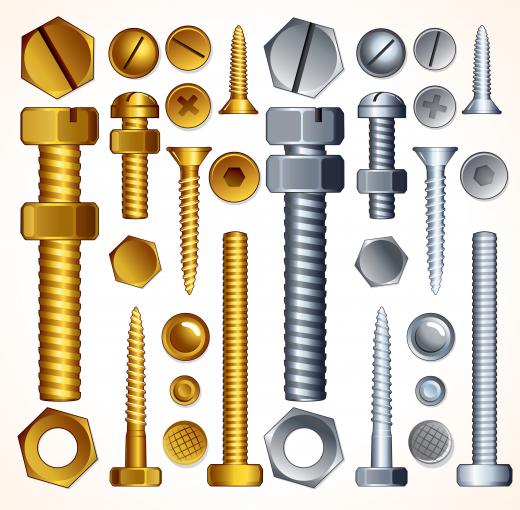At AboutMechanics, we're committed to delivering accurate, trustworthy information. Our expert-authored content is rigorously fact-checked and sourced from credible authorities. Discover how we uphold the highest standards in providing you with reliable knowledge.
What is a Brass Bolt?
A brass bolt is a heavy-duty fastener crafted from an alloy of copper and zinc. Installers use these bolts to join wood, metal or composite materials together, or to fasten objects to surfaces made from one of these materials. A brass bolt is typically held in place using a nut, and a washer is used under the head of the bolt to help maximize performance over time.
Installers can choose from three major brass bolt designs to fit the needs of different applications. Brass carriage bolts feature course threads along their entire length, as well as a smooth, rounded head. These bolts are chosen primarily for the visual appeal they add to furniture and other wooden objects. Holes must be pre-drilled in an object before can carriage bolt can be installed.

Despite its name, a stove brass bolt can be used on a variety of applications. Featuring a slotted head and a partially-threaded shank, these bolts were originally designed to hold up against high heat and corrosion in a metal stove. Today, they can be found on furniture, deck framing, and many metal objects.
Brass machine bolts tend to be larger and stronger than most other brass fasteners. They feature a square head and a partially-threaded shank, and can be found on many heavy-duty applications. An additional style of brass bolts that does not use washers or nuts can be installed in some types of masonry surfaces.
Builders often choose brass bolts because of their natural advantages over other materials. Unlike steel, brass bolts won't rust or corrode when exposed to moisture or chemicals. For example, a brass bolt can hold up much longer in a marine environment than a fastener made from regular steel. Brass is also less vulnerable to gasoline and other corrosive materials, making it well-suited for use in automobiles and industrial machinery.
While stainless steel and solid copper each offer some of the same benefits as brass, both cost more on average than standard brass. Brass bolts also provide a decorative finish that some users may prefer over steel or chrome. Because brass is not as strong or hard as steel, it may not be suitable for supporting unusually high levels of force or weight.
Each brass bolt must be chosen carefully based on the demands of a particular project. Engineers and builders consider factors such as the length and diameter of the bolt as well as the type of material it will be installed in. The texture of the shank and the number of threads per inch can also affect strength and durability.
AS FEATURED ON:
AS FEATURED ON:











Discuss this Article
Post your comments